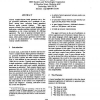Free Online Productivity Tools
i2Speak
i2Symbol
i2OCR
iTex2Img
iWeb2Print
iWeb2Shot
i2Type
iPdf2Split
iPdf2Merge
i2Bopomofo
i2Arabic
i2Style
i2Image
i2PDF
iLatex2Rtf
Sci2ools
ACL
1990
1990
The Limits of Unification
Current complex-feature based grammars use a single procedure--unification--for a multitude of purposes, among them, enforcing formal agreement between purely syntactic features. This paper presents evidence from several natural languages that unification--variable-matching combined with variable substitution--is the wrong mechanism for effecting agreement. The view of grammar developed here is one in which unification is used for semantic interpretation, while purely formal agreement involves only a check for non-distinctness---i.e, variable-matching without variable substitution.
Related Content
| Added | 07 Nov 2010 |
| Updated | 07 Nov 2010 |
| Type | Conference |
| Year | 1990 |
| Where | ACL |
| Authors | Robert Ingria |
Comments (0)

